There were lots of surprises within 3 days in Dien Bien, having a food tray with nearly 20 strange-hearing yet delicious dishes. Famous spices of the Northern Highlands were Doi seed, Mac Khen, Mac Mat leaves, and another interesting seasoning called “cham cheo” which has several types.
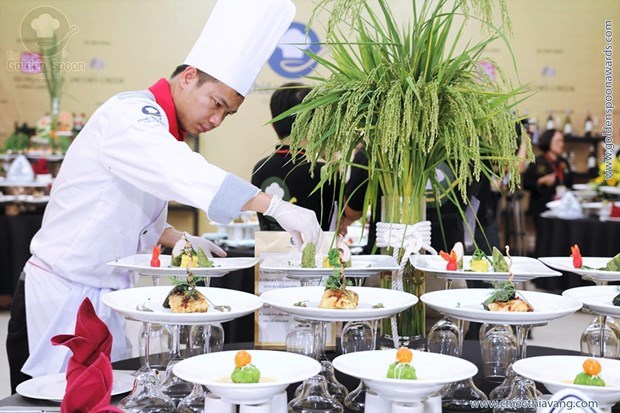
Chef Hoang Van Lien from Muong Thanh – Lao Cai hotel was decorating party table in northern semi-final round.
A week later, we had met northern highland cuisine again on
The Golden Spoon party table and surprisingly experienced creative dishes of
5-star chefs.
1. The crabapple and Doi seed cake was shaped as stalactite
blocks in Son Doong cave’s photos. The cake was really eye-catching and robust
with buttery texture of cream, root beer hint of Doi seeds, and sweetness of
crabapples. “What a unique and exotic dessert!”, food artisan Bui Thi Suong gave
comment. Hilton Hanoi Opera hotel’s chefs were the creators of the cake.
Baking this cake was not difficult but the tip was how they
created and combined all northwest ingredients. Docynia or commonly called crabapples
are used to make wine and Doi seeds are famous spice for seasonings or meats.
However, those Ha Noi chefs were confident to bring them into a dessert. Brief
instruction as following:
- Chop
crabapples into small cubes, blanched to reduce acrid taste then stir-fried
with butter, sugar, and vanilla extract;
- Mash Doi
seeds with some peanuts and cooked in cooking cream about 15 minutes then
filtered to collect all hot cream;
- Mix batter
with foam of egg yorks;
- Add in
gelatin to thicken batter;
- Combine
Min-phoi flour, wheat flour, salt, and butter and knead thoroughly;
- Bake the
dough;
- Cover each
layer of cake with cream and crabapple jam;
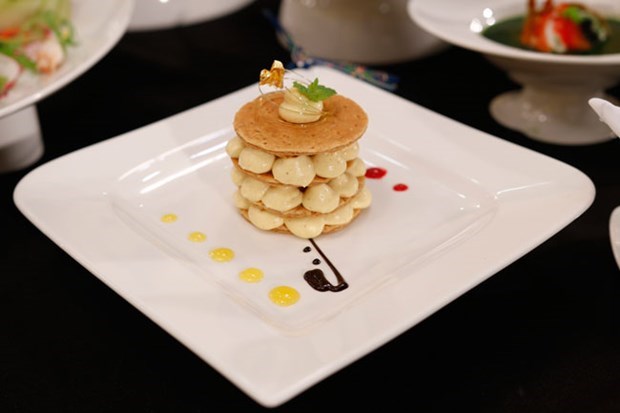
Crabapple cake with hint of Doi seeds.
From highland specialties, Muong Thanh Lao Cai hotel’s chefs
created many other dainty dishes, such as sautéed duck breast with Doi seeds in
fruit sauce. Breast flesh was from a good-size duck then seasoned with salt,
black pepper, and Doi seeds. After 30 minutes, sauté duck breast and squeeze
fat out of the flesh. Bake duck breast about 7 minutes at 160oC until pinky and
soft. The thicken sauce was made from mango flesh grounded with fresh orange
juice then boiled with Doi seeds and seasonings.
Other particular dishes were steamed local pork with wild
leaves in cham cheo sauce, Don leaves salad and Seng Cu rice cooked with fresh
turmeric. Not only using famous local specialty black pork, they also brought
in many regional fruits and spices, such as Mac Mat leaves and fruits, Doi
seeds, apples and pears from Sapa, Nep leaves, lemongrass, and galangal. Chefs
boiled a big pot with spices and vegetables in 30 minutes to extract oil and
savor then added pork into the pot to absorb all the essence from the broth.
The pork was fruity yet robust in your mouth.
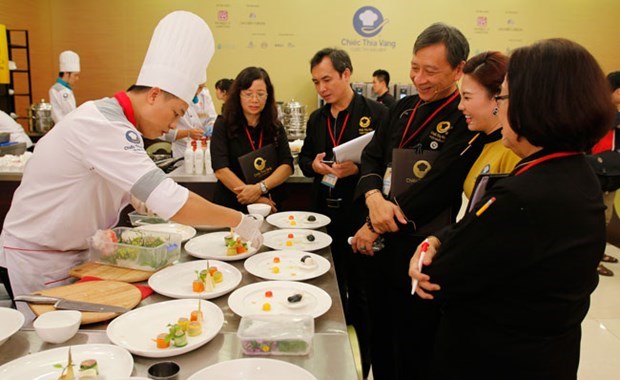
The Golden Spoon judges were pleased by talents and ideas of chefs.
An indispensable seasoning going along with pork is cham
cheo. In Thai minority’s language, “cham” means dipping and “cheo” is an
adjective, which describes the aroma of combined spices. There are 3 – 4 types
of cham cheo, depending on main dishes. Cham cheo for this pork was made from
grilled green peppers, garlic, Mac Khen seeds, salt, MSG, spicy leaves, and a
teaspoon lime juice. A bite of pork was dipped in cham cheo, a bowl of Seng Cu
rice was gone.
2. To collect and to introduce highland specialties, chefs
had to work hard. They varied recipes of local people to their own. Knowledge and modern cooking techniques have
helped them to use up all special ingredients and to create fusion dishes.
Chefs of Dung Tan Restaurant (Thai Nguyen province) introduced
Northwest healthy dishes, which were varied from local recipes, Da Hien salad
and burnt shrimps in rock salt. Da Hien is a wild vegetable in Cao Bang rocky
highlands. This vegetable is so flexible that we can use it in many ways, like
boiling, stir-frying with garlic, or making hot pot. Local people believe that
Da Hien vegetable helps to strengthen bones and heal kidneys. Chef Dinh Trong
Giang picked fresh Da Hien tips, washed thoroughly, blanched then soaked in ice
water to keep them green and crispy. Whole fresh shrimps were placed on
Himalayan rock salt - which was formed over 250 million years ago and
considered pure - together with ginger, hot pepper, and wine to deodorize.
After 15 minute cooking, heat from salt layer brought shrimps to well done.
Peeling crust and heads off, shrimp flesh were placed on Da Hien vegetable,
served with Tien Vua vegetable, carrot, purple cabbage, salmon caviar, and
black garlic.
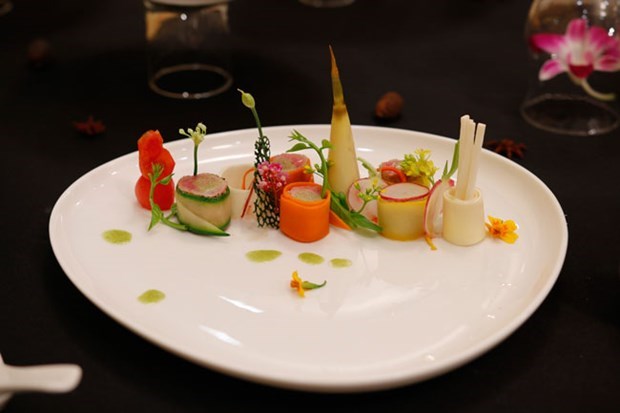
Bamboo shoot salad and red tune rolled in veggie with peanut sauce and cilantro.
Stewing pheasant meat with Ba Kich root is a medicinal dish.
Pheasant meat highly contains nutrition so that it only appeared on royal
dining tables in the past. Chefs cleaned the meat to make fillet while bones
were stewed with pork bone and herbs in about one hour and half. Ba Kich roots
(Morinda officinalis) are known as strengthener for bones, kidneys, and sexual
ability. Dam Duong Hoac (Epimedium), Ngoc Cau mushroom (Balanophora fungosa),
and Nhuc Thung Dung flowers (Cistanche) are rare and valuable herbs and also
known as sexual ability’s supporters. Cogon grass’ roots (Imperata cylindrical)
have natural sweet and can be used as sweetener. Fillet meat were seasoned by
pure salt, ginger, dried onion, and rice wine then bagged in special bag with
holes and put the whole bag into broth pot in 45 minutes.
3. Highland spices surprised people when attending in
high-class dainty dishes. Mac Khen, Doi seeds, and crabapples were combined
with deluxe food in modern cooking methods of molecular gastronomy, such as consommé
and sous vide. Chefs from Pullman Danang Beach Resort (Da Nang city) broke
old-fashion recipes to create goose liver pate with crabapple wine and grilled
Spanish pork served with Italian pasta in Red Delicious applesauce. Spanish
pork is from black pigs, which are raised in forest-side and fed oak fruits so
that the meat is tender and super delicious. Mac Khen seeds have both black
pepper and hot pepper savor, which will rise up the taste of Spanish pork.
Hilton Hanoi Opera hotel’s chefs performed smoking method to
make smoking goat meat in Moc Mat sauce, served with fried rice. Goat meat
(cabrito) is a famous specialty of Ninh Binh province. The best part is
tenderloin and each mature goat provides only 1.5kg tenderloin. Instead of
normally washing goat meat by ginger and rice wine, those 5-star chefs smoked
them by fokienia wood and Thai Nguyen tea. After that, goat meat would be
thinly sliced and seasoned with black pepper, salt, sugar, oyster sauce, and
Moc Mat juice. Well-seasoned slices of meat would be rolled, sautéed then baked
until well done. They added Mac Khen (or black pepper), salt, honey, oyster
sauce, and tapioca flour into Moc Mat sauce then cooked to thicken.
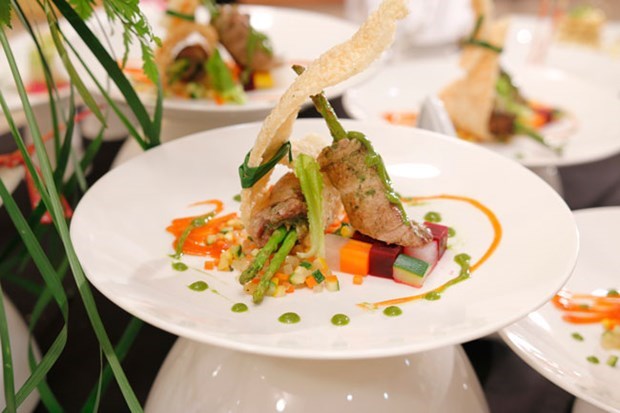
Baked smoked-goat meat in Moc Mat sauce, served with fried rice.
These fusion dishes, Vietnamese taste yet European cooking
style, have shown chefs’ enthusiasm, longing for Vietnamese cuisine to seize
their appropriate places on classy dinning tables. They have been working hard,
varying old-fashion recipes to create new own ones, and widely researching on
regional ingredients and spices in order to bring Vietnamese cuisine to higher
class. Actually, they made it. Chef Hoang Van Duong from Duong’s Restaurant (Ha
Noi city) performed a particularly robust and dainty tray of meat, which had
BBQ beef rolled in pork fat and Moc Mat seed, BBQ pork with Mac Khen seasoning,
and duck pate. Chef Duong said, “Those are unique dishes I’ve learned since I
was in Sapa”. Moreover, chef Duong was willing to guide foreign chefs to cook his
recipes because he though this was a very good way to bring Vietnamese cuisine
to international.
The enthusiasm, creativities, and talents of Vietnamese
chefs do bring more opportunities for northwest highlands’ specialties to have
usages in academic culinary field. We hope to meet them again.
By Nguyen Trang/Nguoi Do Thi